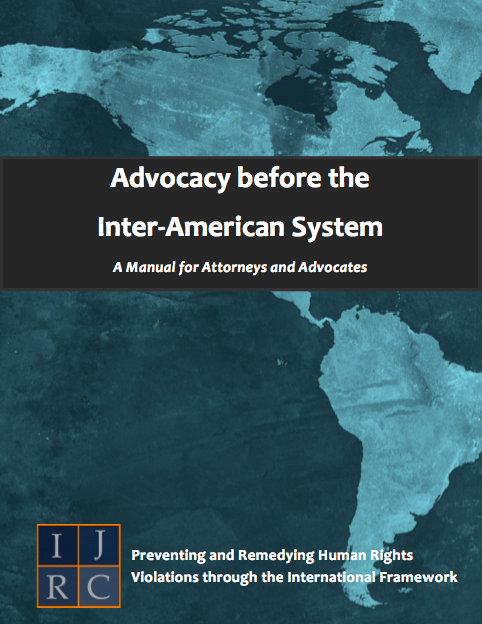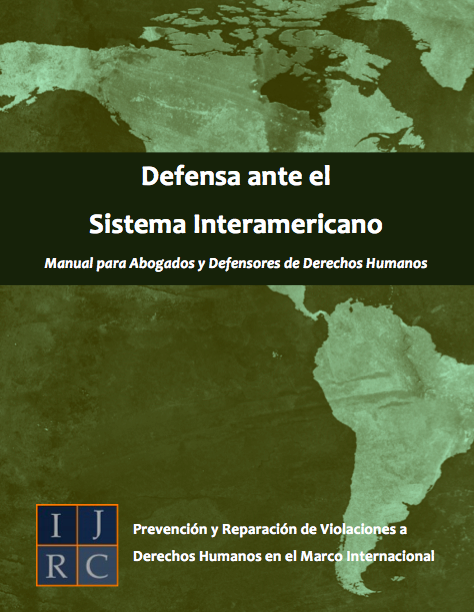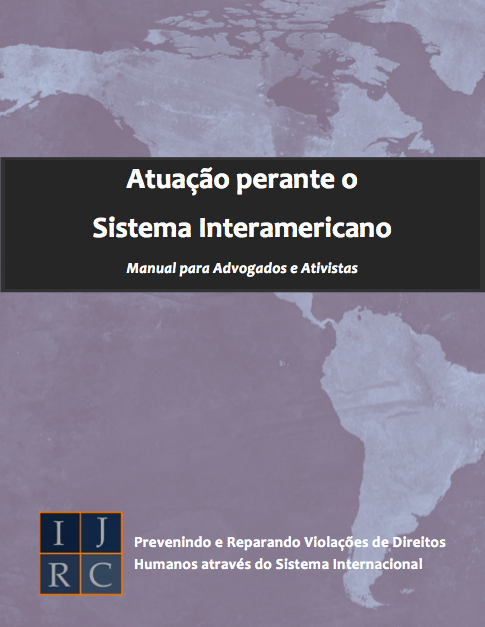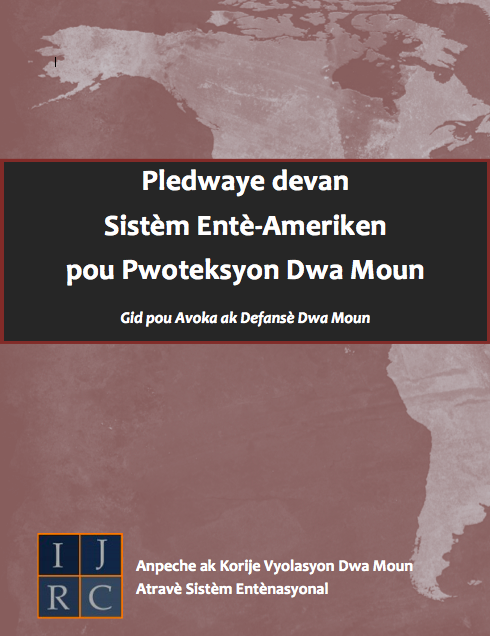The Inter-American System for the protection of human rights is a regional human rights system, and is responsible for monitoring, promoting, and protecting human rights in the 35 independent countries of the Americas that are members of the Organization of American States (OAS).
The Inter-American System is composed of two principal entities: the Inter-American Commission on Human Rights (IACHR) and Inter-American Court of Human Rights (IACtHR). Both bodies can decide individual complaints concerning alleged human rights violations and may issue emergency protective measures when an individual or the subject of a complaint is in immediate risk of irreparable harm. The Commission also engages in a range of human rights monitoring and promotion activities (including through its various rapporteurships), while the Court may issue advisory opinions on issues pertaining to the interpretation of the Inter-American instruments at the request of an OAS organ or Member State.
Additional bodies within the Inter-American System focus on particular rights or groups. These include the Inter-American Commission of Women (CIM, by its Spanish initials), the Working Group on the Protocol of San Salvador, and the Follow-up Mechanism to the Belém do Pará Convention (MESECVI).
The explanations and resources below provide greater detail on each mechanism’s mandate and functions. Visit the IJRC News Room for articles on recent developments involving the Inter-American System.
Contents
- Additional Resources
- Inter-American Commission on Human Rights
- The Rapporteurships of the Inter-American Commission on Human Rights
- Inter-American Court of Human Rights
- Inter-American Commission of Women
- Working Group on the Protocol of San Salvador
- Follow-up Mechanism to the Belém do Pará Convention (MESECVI)
- Inter-American Institute of Human Rights
- Inter-American Instruments
Additional Resources
IJRC’s publication, Advocacy before the Inter-American System: Manual for Attorneys and Advocates (2014) provides detailed information on the System, its components, complaints procedure, and decisions (also available in Spanish, Portuguese and Haitian Creole).
View the exhaustion guide for an overview of how the Inter-American human rights bodies interpret and apply the procedural requirement of exhaustion of domestic remedies in their complaints processes.
For quick reference, view our one-page overviews of the IACHR, IACtHR, CIM, and Working Group, as well as two-page country factsheets on each of the 35 Member States of the OAS.
IJRC’s informational video explains the Inter-American System through four animated chapters and interviews with experienced human rights defenders. These videos are also available in Spanish, Portuguese, and Haitian Creole language versions, and may be downloaded free of charge on Vimeo or YouTube. To request a copy of the videos and manual on DVD or USB flash drive, please contact IJRC.
Use the Video Guide to follow along:
1. What is the Inter-American System? 2. What Rights Are Protected?
3. How to Present a Petition
4. How the Commission Processes Petitions 5. Insights from Practitioners
Inter-American Commission on Human Rights
Seat: Washington, DC Operating Since: 1960
The Inter-American Commission on Human Rights (IACHR) addresses human rights conditions and violations in the 35 Member States of the OAS. Those States are: Antigua and Barbuda, Argentina, Bahamas, Barbados, Belize, Bolivia, Brazil, Canada, Chile, Colombia, Costa Rica, Cuba, Dominica, Ecuador, El Salvador, Grenada, Guatemala, Guyana, Haiti, Honduras, Jamaica, Mexico, Nicaragua, Panama, Paraguay, Peru, Dominican Republic, Saint Kitts and Nevis, Saint Lucia, Saint Vincent and the Grenadines, Suriname, Trinidad and Tobago, United States of America, Uruguay, and Venezuela.
Established by an OAS resolution in 1959, the IACHR began operating in 1960, observing human rights conditions via on-site visits, and in 1965 was authorized to begin processing specific complaints of human rights violations. OAS Member States recognized the IACHR as the region’s principal human rights body through a protocol to the OAS Charter which was adopted in 1967 and entered into force in 1970.
The Commission is composed of seven members who are elected by the OAS Member States and who serve part-time and in their individual capacities for four-year terms that may be renewed once. The commissioners are supported by the staff of the Executive Secretariat. To read more about the commissioners and their election process, see our IACHR Composition & Election guide.
In June 2019, four seats on the Commission were filled in an election. To read about the 2019 candidates and election process, see our two-page overview.
In addition to carrying out country visits and receiving complaints, the Commission also holds thematic hearings on specific topical areas of concern, publishes studies and reports, requests the adoption of precautionary measures to protect individuals at risk, and has established several thematic rapporteurships to more closely monitor certain human rights themes or the rights of specific communities in the hemisphere.
Individuals, groups of individuals, and non-governmental organizations recognized in any OAS Member State may submit complaints (“petitions“) concerning alleged violations of the American Declaration of the Rights and Duties of Man, American Convention on Human Rights, and other regional human rights treaties (listed below). The Commission generally receives at least 2,000 petitions every year.
The Commission’s Statute and Rules of Procedure outline its structure, objectives, and procedures, although some aspects of the day-to-day processing of cases are determined by the legal staff of the Executive Secretariat.
The Commission’s website contains its published cases (reports on admissibility, merits, friendly settlements and decisions to archive), decisions on requests for precautionary measures, and applications to the Inter-American Court, in addition to its annual reports, thematic reports, and country reports. The IACHR publishes video and audio recordings of the hearings held during each Period of Sessions; these are also organized by theme.
The Rapporteurships of the Inter-American Commission on Human Rights
Inter-American Commission on Human Rights began establishing rapporteurships in 1990. Rapporteurships are special mechanisms dedicated toward protecting and promoting the rights of vulnerable groups of people who have historically faced marginalization. The establishment of rapporteurships allowed the Commission to oversee human rights conditions on topics of particular concern.
As of April 2020, there are nine thematic rapporteurships, and two special rapporteurships. All of these special mechanisms gather and disseminate information on how different groups of people or different rights are being protected throughout the Organization of American States (OAS) Member States. The special mechanisms use this information to develop reports or recommendations to Member States to help them better protect and promote the human rights of their people, and to guide the Inter-American Commission on Human Rights in its decisions.
Thematic rapporteurships are generally overseen by one of the Commission’s seven Commissioners, who undertake their duties on a part-time basis. The Commission itself decides which members will be responsible for which thematic rapporteurships.
The Commission also designates country rapporteurs from among the seven Commissioners. Each Member State is assigned a country rapporteur, who is responsible for carrying out activities assigned by the Commission within that State. Thematic rapporteurs often collaborate with the country rapporteurs in conducting country visits within the Member States.
In contrast, the special rapporteurs – on freedom of expression and on economic, social, cultural, and environmental rights – are not members of the Commission. They are independent experts chosen by the Commission, and who serve on a full-time basis for a period of three years, which may be renewed once.
The rapporteurships are responsible for reporting their activities to the Commission. In turn, the Commission is tasked with presenting Annual Reports to the OAS General Assembly. In these reports, the Commission provides an account of the rapporteurships’ activities, including any reports produced and promotional activities undertaken.
Principal Functions
As described in greater detail at the links below, each special mechanism’s capabilities are set forth in its mandate. Generally, rapporteurships and special rapporteurships may:
- advise the Commission in its processing of individual petitions, cases, and requests for precautionary and provisional measures related to their mandate;
- undertake country visits to investigate human rights conditions;
- conduct thematic reports and studies;
- develop recommendations to Member States;
- organize seminars, workshops, and specialized meetings;
- raise awareness of human rights issues;
- receive information from individuals and civil society;
- provide the Commission with annual reports on their work; and,
- contribute to the development of international human rights law.
In 2019, the IACHR adopted Guidelines on the Activities and Functions of its two special rapporteurships.
Creation of Rapporteurships
The Commission is empowered to create rapporteurships that are dedicated to areas of special interest, in order to promote and protect the human rights of vulnerable groups throughout the Americas. See Rules of Procedure of the Inter-American Commission on Human Rights, art. 15. To create a rapporteurship, the majority of the Commission’s members must adopt a resolution. The resolution must delineate the functions and scope of the mandate, provide a description of the activities to be carried out, and an accounting of how these activities will be financed. See id.
Thematic rapporteurships are allocated among the seven Commissioners. The rapporteurships usually are designated during the first session of the Commission, but appointments may be made whenever necessary. Thematic rapporteurs undertake their duties on a part-time basis for a three-year term, which may be renewed once. See id.
To elect a special rapporteur, the Commission must publicize the position, which allows individuals who are not members of the Commission to apply. The Commission then accepts comments from OAS Member States and civil society regarding the final candidates, and ultimately reaches a majority vote to elect the rapporteur. The Commission is required to publish the grounds for its decision. Special rapporteurs have a duty to disclose any potential conflicts of interest they have with the position, and the Commission has the ability to replace a rapporteur for reasonable cause. Special rapporteurs serve for three-year terms in a full-time capacity unless the mandate terminates earlier, and may renew their term once. See id.
Thematic Rapporteurships
The following 11 rapporteurships have been established:
- Rapporteurship on Human Rights Defenders
- Rapporteurship on the Rights of Afro-Descendants and against Racial Discrimination
- Rapporteurship on the Rights of the Child
- Rapporteurship on the Rights of Indigenous Peoples
- Rapporteurship on the Rights of Lesbian, Gay, Trans, Bisexual, and Intersex Persons
- Rapporteurship on the Rights of Migrants
- Rapporteurship on the Rights of Persons Deprived of Liberty
- Rapporteurship on the Rights of Women
- Rapporteurship on the Rights of Persons with Disabilities (Spanish only)
- Special Rapporteurship for Freedom of Expression
- Special Rapporteurship on Economic, Social Cultural, and Environmental Rights
Inter-American Court of Human Rights
Seat: San José, Costa Rica Operating Since: 1979
The Inter-American Court of Human Rights is the judicial organ of the Inter-American human rights system. The Court’s mandate is more limited than that of the Commission because the Court may only decide cases brought against the OAS Member States that have specifically accepted the Court’s contentious jurisdiction and those cases must first be processed by the Commission. Additionally, only States parties and the Commission may refer contentious cases to the Court.
The seven judges of the Court are independent, but are chosen by States through the OAS General Assembly. Judges are elected for a six-year term, once renewable. The Court and its judges convene several times per year for sessions lasting up to two weeks, but its staff works year-round. To read more about the judges and their election process, see our IACtHR Composition & Election guide.
As of January 2021, 24 OAS Member States are States parties to the American Convention on Human Rights, and 20 have opted to accept the Court’s contentious jurisdiction in accordance with Article 62 of the American Convention. The 20 States over which the Court may exercise its contentious jurisdiction are: Argentina, Barbados, Bolivia, Brazil, Chile, Colombia, Costa Rica, Dominican Republic, Ecuador, El Salvador, Guatemala, Haiti, Honduras, Mexico, Nicaragua, Panama, Paraguay, Peru, Suriname, and Uruguay. Previously, Trinidad and Tobago and Venezuela had both accepted the Court’s jurisdiction, but withdrew from that jurisdiction when they denounced the American Convention, in 1998 and 2012, respectively. The OAS recognized Venezuela’s ratification of the American Convention by opposition leader Juan Guaidó in 2019.
The Court began operating in 1979, and soon issued several advisory opinions, but did not begin exercising its contentious jurisdiction until 1986, when the Commission submitted the first contentious case: Velasquez Rodriguez v. Honduras, regarding which the Court issued a judgment on the merits in 1988.
Over the Court’s first several decades in operation, its annual case load has more than doubled; many more States have found themselves before the Court; and the Court has adjudicated a significant range of rights protected by the American Convention and ancillary agreements, from extrajudicial execution and forced disappearance cases, to labor, land, and freedom of expression rights.
The Court’s Statute and Rules of Procedure outline its structure, objectives, and procedures.
View the Court’s judgments, as well as its annual reports and other publications on its website. Videos of the Court’s hearings are available on its Vimeo page. The Audio Library of the Court, which includes audio files of the public hearings that have been held in the 40 years of the Court’s existence, can be accessed via Soundcloud.
Inter-American Commission of Women
Seat: Washington, DC Operating Since: 1928
The Inter-American Commission of Women (CIM, or la Comisión Interamericana de Mujeres, in Spanish) is a specialized inter-governmental agency within the Organization of American States (OAS). CIM is the only hemisphere-wide policy forum on women’s rights and gender equality in the Americas. Its counterpart, the CIM Executive Committee, complements its work and meets more regularly to discuss routine matters and immediate concerns. CIM is based at the OAS headquarters in Washington, District of Columbia, United States.
The Assembly of Delegates is CIM’s highest authority, and is composed of Delegates from all participating OAS Member States. The Assembly holds biennial meetings in OAS Member States and organizes the Meeting of Ministers of the Highest-Ranking Authorities every four years. CIM Assembly Delegates: CIM Delegates may come from all participating OAS Member States.
CIM delegates represent 34 OAS Member States (Cuba is not represented). Those are: Antigua and Barbuda, Argentina, Bahamas, Barbados, Belize, Bolivia, Brazil, Canada, Chile, Colombia, Costa Rica, Dominica, Ecuador, El Salvador, Grenada, Guatemala, Guyana, Haiti, Honduras, Jamaica, Mexico, Nicaragua, Panama, Paraguay, Peru, Dominican Republic, Saint Kitts and Nevis, Saint Lucia, Saint Vincent and the Grenadines, Suriname, Trinidad and Tobago, United States of America, Uruguay, and Venezuela.
CIM’s activities include: supporting Member States, at their request, in their compliance with their international and InterAmerican commitments to women’s human rights, gender equity and equality; collaborating with Member States, international and civil society organizations, academics, and private actors to support women’s rights and gender equality in the region; providing counsel to the OAS on all women’s rights- and gender equality-related issues; reporting annually to the OAS General Assembly regarding CIM’s work, progress, and particular topics of concern at a thematic and national level.
CIM’s work is guided by its Statute, Regulations, Rules of Procedure of the CIM Assembly of Delegates, and the Agreement between CIM and the OAS.
Working Group on the Protocol of San Salvador
The Working Group on the Protocol of San Salvador is an intergovernmental monitoring body which oversees implementation of the Protocol of San Salvador, an additional and optional protocol to the American Convention on Human Rights that enshrines social, economic, and cultural rights. The Working Group functions in the framework of the Inter-American Council for Integral Development. Pursuant to resolution AG/RES. 2262 (XXXVII-O/07), adopted on June 5, 2007, the Working Group is tasked with monitoring the implementation of the Protocol of San Salvador, and examining the periodic reports that States parties are required to submit.
The Working Group is composed of five members: three government representatives elected by the States parties during the General Assembly of the OAS, taking account of equitable geographic distribution; one independent expert; and, one member of the Inter-American Commission on Human Rights, in addition to three alternate members (one from each category). Civil society organizations may participate in joint meetings with the Working Group and in consultations.
Nineteen of the 35 OAS Member States have signed the Protocol and 16 have ratified it. Those 16 States parties are: Argentina, Bolivia, Brazil, Colombia, Costa Rica, Ecuador, El Salvador, Guatemala, Honduras, Mexico, Nicaragua, Panama, Paraguay, Peru, Suriname, and Uruguay.
The Working Group’s activities include: preparing Progress Indicators for Measuring Rights Under the Protocol of San Salvador and making recommendations to States; analyzing States parties’ reports on their implementation of the Protocol of San Salvador; publishing activity reports; engaging with civil society on various issues related to its mandate; and preparing and compiling other resources and tools useful for advancing social, economic, and cultural rights.
The Working Group’s work is informed by the Guidelines for Preparation of Progress Indicators in the Area of Economic, Social and Cultural Rights and Standards for the preparation of Periodic Reports pursuant to the Protocol of San Salvador.
Follow-up Mechanism to the Belém do Pará Convention (MESECVI)
The Follow-up Mechanism to the Belém do Pará Convention (MESECVI) is a specialized intergovernmental entity within the OAS, charged with assisting States parties in their implementation of the Inter-American Convention on the Prevention, Punishment, and Eradication of Violence against Women (Belém do Pará Convention). As of April 2020, there are 32 States parties to the Belém do Pará Convention: Antigua and Barbuda, Argentina, Bahamas, Barbados, Belize, Bolivia, Brazil, Chile, Colombia, Costa Rica, Dominica, Dominican Republic, Ecuador, El Salvador, Grenada, Guatemala, Guyana, Haiti, Honduras, Jamaica, Mexico, Nicaragua, Panama, Paraguay, Peru, Saint Kitts and Nevis, Saint Lucia, Saint Vincent and the Grenadines, Suriname, Trinidad and Tobago, Uruguay, and Venezuela.
MESECVI’s work is coordinated by a Committee of Experts, composed of independent experts, who serve in their individual capacities and are appointed by the States parties. The Committee includes 32 members, one from each State party.
The Committee of Experts prepares and disseminates a questionnaires to States parties on their efforts to implement the Convention. It then evaluates and publishes States’ responses, along with recommendations, in its hemispheric reports. In its follow-up reports, the Committee prepares progress indicators, which the States parties use to report on their subsequent implementation. MESECVI also produces thematic reports, general recommendations, model laws, and other resources to guide States in addressing gender-based violence.
MESECVI’s activities are guided by its Statute, Rules of Procedure of the Conference of States Party, and Rules of Procedure of the Committee of Experts, published together in the Basic Documents of the MESECVI.
Inter-American Institute of Human Rights
The Court and Commission’s human rights promotion work is complemented by the Inter-American Institute of Human Rights, an autonomous research and educational institution based in San José, Costa Rica. The Institute (best known by its Spanish acronym “IIDH”) provides free online courses on various human rights topics, publishes numerous books, operates a Digital Library (navigation in Spanish), moderates a discussion listserve, and organizes seminars and workshops for civil society throughout the Americas. In addition to its online resources, the Institute is open to visitors seeking research assistance, use of the physical library, or to purchase publications.
Inter-American Instruments
The Commission and Court are charged with interpreting and applying a number of regional human rights instruments, which include the:
- American Declaration of the Rights and Duties of Man
- American Convention on Human Rights
- Additional Protocol to the American Convention on Human Rights in the Area of Economic, Social and Cultural Rights “Protocol of San Salvador”
- Protocol to the American Convention on Human Rights to Abolish the Death Penalty
- Inter-American Convention to Prevent and Punish Torture
- Inter-American Convention on Forced Disappearance of Persons
- Inter-American Convention on the Prevention, Punishment and Eradication of Violence Against Women “Convention of Belém do Pará”
- Inter-American Convention on the Elimination of All Forms of Discrimination Against Persons with Disabilities
- Inter-American Convention Against Racism, Racial Discrimination, and Related Forms of Intolerance
- Inter-American Convention Against All Forms of Discrimination and Intolerance
- Inter-American Convention on Protecting the Human Rights of Older Persons
Additionally, the following documents guide the Court and Commission’s interpretation of the above instruments:




